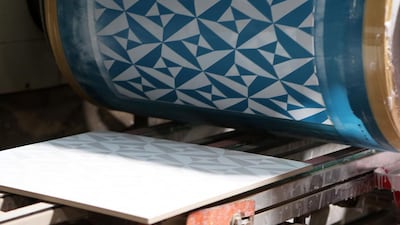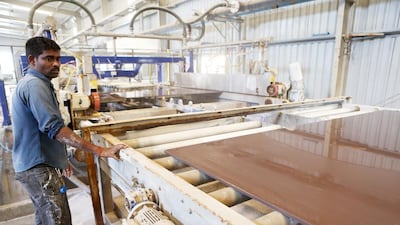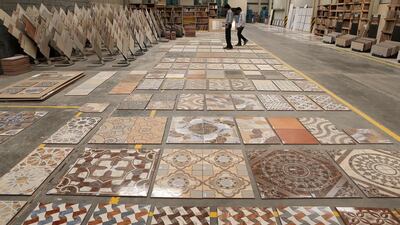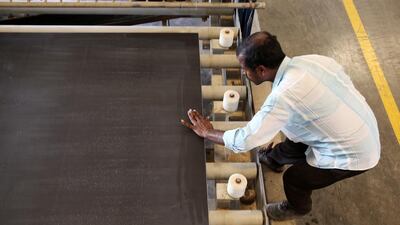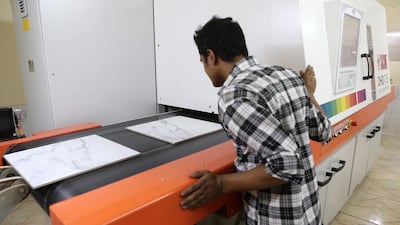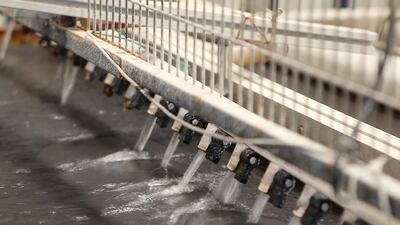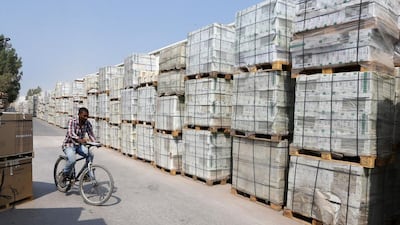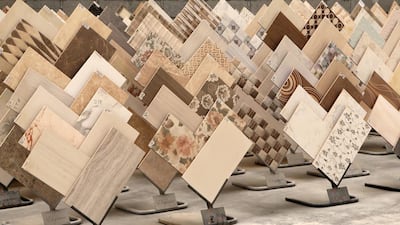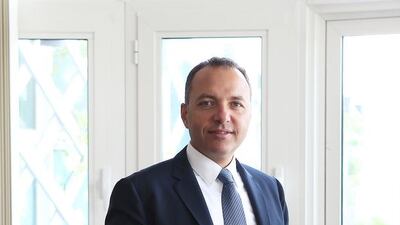It is now 25 years since the first tiles began to roll off the production line at RAK Ceramics and its evolution during that period has been quite remarkable.
From fairly humble beginnings producing a standard line of 20cm x 20cm ceramic tiles, the company has become a heavyweight of its industry, generating revenue of almost Dh3.08 billion last year and net income of Dh310 million. It is now one of the biggest ceramics manufacturing firms in the world, producing 110 million square metres of tiles per year with 6,000 individual product lines, and five million pieces of sanitary ware, as well as tableware pieces and taps for bathrooms.
The company was founded as a result of an initiative by Ras Al Khaimah’s ruler, Sheikh Saud bin Saqr, to diversify the emirate’s economy. According to the company’s chief executive, Abdallah Massaad, RAK Ceramics has made the most of key resources such as the clays and raw materials found naturally close to its base in Ras Al Khaimah, as well as benefiting from substantial investments in machinery and technology.
The fact that fuel costs in the region are low for what is an energy-intensive business (energy forms 22 per cent of the firm’s tile production costs) also helps, but Mr Massaad is keen to point out that it pays market rates for power. “In the region, there are a lot of countries subsidised, but we grew without any subsidy.”
Following its initial investment, the company doubled capacity in 1993 and has been doing so every two years since, says Mr Massaad. “In 2000, we built our first plant outside the UAE, in Bangladesh. We added capacity in Sudan, China, Iran and India.”
RAK Ceramics currently has about 15,000 employees in nine countries. About half of these are based in this country, where it has 14 factories. Ten of these produce ceramic tiles, two make sanitary ware, one tableware and one is a joint venture with a German manufacturer that produces taps.
Mr Massaad says its plants outside the UAE generally tend to serve domestic markets, while most of its local production is exported. About 70 per cent of the firm’s entire output is produced here and of this 75 per cent is shipped overseas.
“We are among the top three exporters in the UAE,” he says. “We are very proud to raise the UAE flag around the world.”
In 2014, Sheikh Saud sold a 30.6 per cent stake in the company, whose shares are listed on the Abu Dhabi Securities Exchange, to Samena Capital, making it the largest single shareholder in the company. Since then, RAK Ceramics has embarked on a “value creation plan”, which has focused on divesting or closing loss-making businesses, as well as those considered to be non-core.
For instance, it closed a business in Sudan that had suffered from the effects of hyperinflation, while in China the ferocity of competition meant there were many domestic suppliers who were willing to undercut the firm.
“We were producing a quality product and we did not want to compromise,” says Mr Massaad.
“But producing a quality product is costly and that was more difficult to sell.”
Elsewhere, the non-core businesses disposed of include a minerals company in Indonesia, ventures in Bangladesh selling textiles and pharmaceuticals, and several assets in its home emirate that offered contracting, buildings material supplies and other services. The proceeds of these, and 15 town houses the company had bought in Al Hamra Village, have been reinvested back into the business.
Last year it spent Dh305m on upgrades to production facilities in Bangladesh and the UAE. Elsewhere, it has bought out minority stakes held by investors in its Iranian and Indian manufacturing businesses and joint venture partners in three European distributorships. It unveiled a new, simpler corporate branding at a trade show in Italy last month.
The value creation plan is still ongoing and the company has stakes in other businesses, including a hotel, a mechanical, electrical and plumbing business and a stake in a warehouse leasing business, among others.
Proceeds from these could again be used to boost capital, or returned to shareholders, depending on requirements.
Mr Massaad says even after recent expansion, the company’s utilisation rates remain high.
“Over all of the group, we have 90 per cent capacity utilisation.”
It has the necessary land and infrastructure required for further expansion in Ras Al Khaimah, if required, but this is dependent on economic conditions improving.
Mr Massaad also cites innovations in technology such as digital printing and use of materials that have allowed the firm to offer ceramics that replicate the feel of natural materials such as marble, stone and wood, as well as antimicrobial tiles for use in hospitals, luminous tiles for emergency exit routes and giant tiles up to 1.3 metres wide and 3 metres tall.
“ We are among a handful of manufacturers who started with this technology worldwide, and I can say proudly that in all of Asia and the Middle East we were the only one,” he says.
Almost two and a half years after making its investment, Samena Capital is in no hurry to sell its stake, according to its senior vice-president Wassim Moukahhal, who sits on RAK Ceramics’ board. He says the company is “very attractive” to investors because it sells to so many countries – 160 in total.
“If there is one market that is facing a downturn in economic activity at any one time, then the company would be insulated to some extent from that,” he says, citing the current slowdown in Saudi Arabia as an example.
He says recent improvements to the business include a much more defined strategy and greater success in selling to corporate clients in hospitality and retail. For example, its tiles are used to achieve a uniform look in many H&M stores both in Europe and Asia, while in the Middle East the company supplies several major retail groups including Alshaya, Azadea and Chalhoub.
Despite this, Mr Moukahhal says there is still much work to be done before the value creation plan is complete.
“One of the main focus areas going forward over the next 12 to 18 months is to turnaround the India business and to ensure that it achieves its full potential. India is a very large and growing market, and we are one of the few international brands who manufacture in India.”
Another is RAK Porcelain, which Mr Moukahhal describes as a “high growth” business providing tableware to hospitality clients and airport lounges, with more than half of its sales currently coming from Europe.
“You need four to five years to work with a management to really turnaround and unlock value in a business,” he says. “We are halfway through this. We are very happy with the progress we have achieved to date.”
Anoop Fernandes, an analyst with the Securities & Investment Company based in Bahrain, points out that RAK Ceramics’ Indian operations have recently witnessed a slump both in volumes and selling prices.
“Tile revenues were down 27.5 year on year during the second quarter and sanitary ware revenues were down 33 per cent.”
Despite this, and the fact that overall year-on-year sales were 3.6 per cent lower in the second quarter compared with the same period last year, he maintains a “buy” rating on the stock, saying the decline was less severe than regional peers who faced double-digit drops in revenue and profit during the first six months of the year.
“We like it for its geographically diversified business compared to regional peers and a healthy dividend outlook,” he says.
mfahy@thenational.ae
Follow The National's Business section on Twitter
